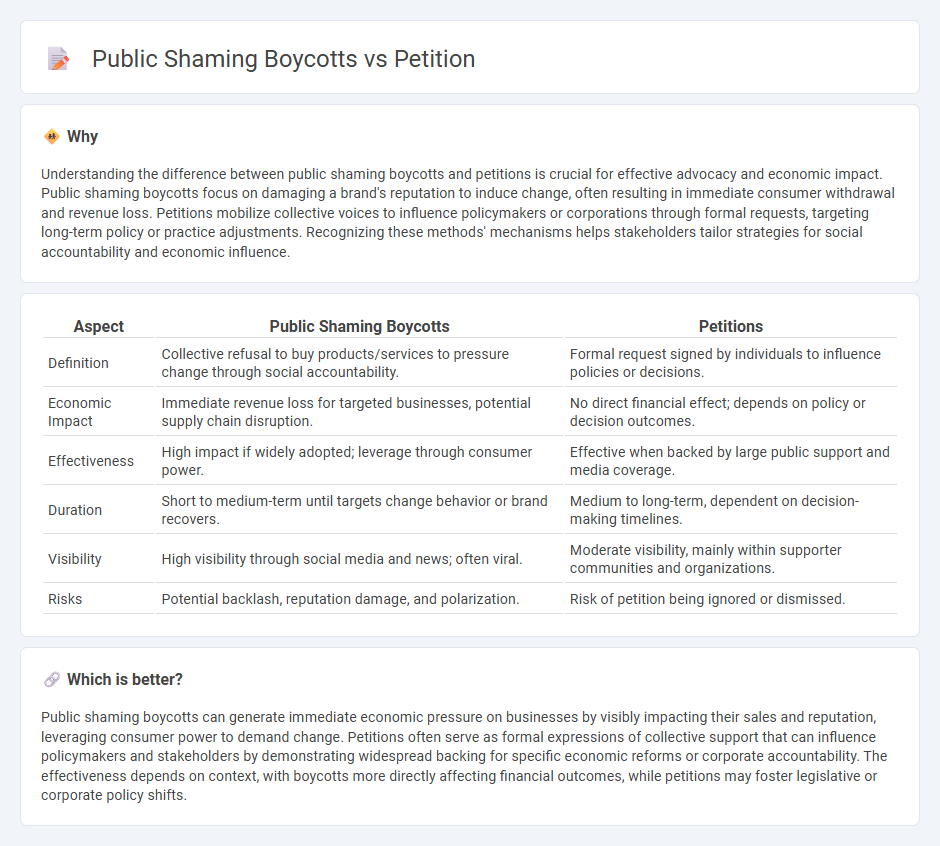
Public shaming boycotts leverage social pressure to rapidly influence corporate behaviors, often resulting in immediate financial impact on targeted businesses. Petitions aggregate collective demands for change and can drive legislative or policy reforms through formal channels, though typically over a longer timeframe. Explore the effectiveness and economic implications of these tactics to understand their roles in market dynamics.
Why it is important
Understanding the difference between public shaming boycotts and petitions is crucial for effective advocacy and economic impact. Public shaming boycotts focus on damaging a brand's reputation to induce change, often resulting in immediate consumer withdrawal and revenue loss. Petitions mobilize collective voices to influence policymakers or corporations through formal requests, targeting long-term policy or practice adjustments. Recognizing these methods' mechanisms helps stakeholders tailor strategies for social accountability and economic influence.
Comparison Table
| Aspect | Public Shaming Boycotts | Petitions |
|---|---|---|
| Definition | Collective refusal to buy products/services to pressure change through social accountability. | Formal request signed by individuals to influence policies or decisions. |
| Economic Impact | Immediate revenue loss for targeted businesses, potential supply chain disruption. | No direct financial effect; depends on policy or decision outcomes. |
| Effectiveness | High impact if widely adopted; leverage through consumer power. | Effective when backed by large public support and media coverage. |
| Duration | Short to medium-term until targets change behavior or brand recovers. | Medium to long-term, dependent on decision-making timelines. |
| Visibility | High visibility through social media and news; often viral. | Moderate visibility, mainly within supporter communities and organizations. |
| Risks | Potential backlash, reputation damage, and polarization. | Risk of petition being ignored or dismissed. |
Which is better?
Public shaming boycotts can generate immediate economic pressure on businesses by visibly impacting their sales and reputation, leveraging consumer power to demand change. Petitions often serve as formal expressions of collective support that can influence policymakers and stakeholders by demonstrating widespread backing for specific economic reforms or corporate accountability. The effectiveness depends on context, with boycotts more directly affecting financial outcomes, while petitions may foster legislative or corporate policy shifts.
Connection
Public shaming, boycotts, and petitions serve as powerful grassroots tools in influencing economic behavior by targeting companies or individuals to induce change. These tactics leverage social and consumer pressure to drive policy shifts, corporate responsibility, or market adjustments without formal regulatory action. Their interconnected use amplifies economic impact by mobilizing public sentiment into coordinated financial and reputational consequences.
Key Terms
Collective Action
Petitions mobilize collective action by aggregating individual signatures to formally demand change from authorities or organizations, demonstrating unified public support. Public shaming boycotts activate collective consumer power to hold entities accountable by encouraging widespread refusal to engage with products or services, leveraging reputational and economic impacts. Explore how these collective actions shape social and political outcomes through coordinated public engagement.
Consumer Behavior
Petitions and public shaming boycotts both influence consumer behavior by mobilizing collective action to hold companies accountable, driving awareness and moral considerations in purchasing decisions. Petitions often encourage constructive engagement and incremental change, while public shaming boycotts rely on social pressure and reputational risk to prompt immediate behavioral shifts. Explore the dynamics of these strategies to understand their distinct impact on consumer activism.
Social Pressure
Petitions harness collective voices to demand change, leveraging social pressure through formal requests often backed by signatures. Public shaming and boycotts apply more direct social pressure by targeting individuals or organizations, aiming to provoke immediate behavioral shifts through widespread criticism and economic impact. Explore strategies to maximize social influence in advocacy efforts.
Source and External Links
Petition - Wikipedia - A petition is a formal request, typically addressed to a government official or public body and often signed by many individuals, seeking action on a particular issue.
petition | Wex | US Law | LII / Legal Information Institute - In legal contexts, a petition refers to a formal written application submitted to a court or official body requesting specific judicial action.
I-130, Petition for Alien Relative - USCIS - The I-130 petition is used by U.S. citizens or lawful permanent residents to establish a relationship with a foreign relative for U.S. immigration purposes.
 dowidth.com
dowidth.com